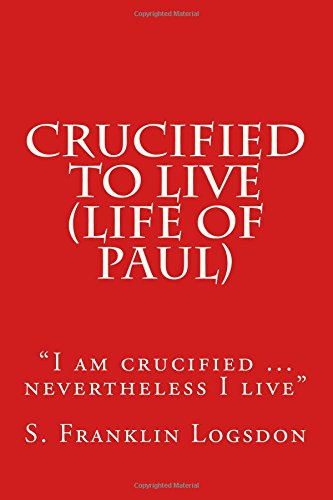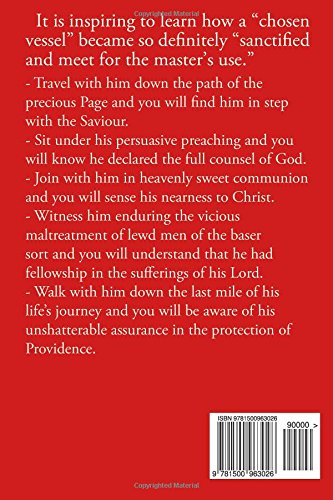Description
CRUCIFIED TO LIVE
“I am crucified . . . nevertheless I live” (Paul)
by
S. Franklin Logsdon
CHAPTER ONE PAUL CRUCIFIED TO LIVE. 8
CHAPTER TWO PAUL’S VISION VITALIZED. 17
CHAPTER THREE PAUL WAS A CHRISTIAN. 33
CHAPTER FOUR PAUL SALUTES A NEW CAPTAIN. 42
CHAPTER FIVE PAUL’S KEYNOTE AT CORINTH. 56
CHAPTER SIX PAUL’S BELIEF IN THE BLESSED HOPE. 69
CHAPTER SEVEN PAUL AND PREVAILING PRAYER. 80
CHAPTER EIGHT PAUL’S PERSISTENT PERSUASION. 92
CHAPTER NINE PAULS PASTORAL PRESCRIPTION. 103
CHAPTER TEN PAUL TUTORS TITUS. 115
CHAPTER ELEVEN PAUL PROMOTES HIS PROTEGE. 127
CHAPTER TWELVE PAUL’S PERILOUS EUROCLYDON. 138
CHAPTER THIRTEEN PAUL DECRIES SATANIC CHICANERY. 149
CHAPTER FOURTEEN PAUL FOUND FELLOWSHIP. 161
CHAPTER FIFTEEN PAUL AND THE PARENTAL HEARTH. 171
CHAPTER SIXTEEN PAUL AND THE MATTER OF MISSIONS. 181
CHAPTER SEVENTEEN PAUL’S INTRIGUING TRAVELOGUE. 193
CHAPTER EIGHTEEN PAUL’S FORCEFUL FINALIES. 204
CHAPTER NINETEEN THE TRELLIS OF PAUL’S AUTOBIOGRAPHY 214
TO MY BELOVED WIFE,
WHOSE LOVE AND LOYALTY IN THE LORD
HAVE MADE HER A CONSTANT AND COVETED COMPANION,
I AFFECTIONATELY INSCRIBE THIS VOLUME
FOREWORD
Some months ago I had the blessed privilege of reading in manuscript some of the chapters of this volume, and I was exceedingly glad to know they would appear in book form. Now the book has been produced, and through its pages, by the Grace of God, many will be blessed.
In his own life the author has proved the blessed meaning of the Divine paradox that forms the title, which we each must prove for ourselves if we would walk the Pauline way. From the day of his conversion, Paul becomes the greatest Christian warrior who ever buckled on sword for the Lord and assaulted the citadel of Mansoul for Christ. He has left us an example that we might follow in his steps.
“I am crucified with Christ: nevertheless I live.”
“This is a great mystery even to myself,” says Paul, “but I tell you how it has been fulfilled in me. When the law of God came home to me I saw that I was a dead man. I saw that the wages of sin like mine was death. But just then it was that God in His grace to me revealed His Son in me. Revealed Him in me a very mystery of godliness; revealed Him as made sin, as crucified for sin, and thus as the ransom and Redeemer of my soul. Had I died for my own sin, which I was just about to do, I had died forever: I had died the first and the second death. But dying in and with Christ, I both died and yet lived. One with Him in His death, I began to live in His resurrection life. I awoke and, after the Cross, found myself a new creature; old things had passed away, and all things had become new. I am dead to some things—dead and never to see resurrection. I am dead to the law and the law is dead to me. The law sometimes looks at me as if it knew me and had something against me, and was about to bring up something against me; but after a time it looks at me and passes me by.
“At such moments I tremble to my very heart; but at such moments God again reveals His Son in me, and I am enabled to say: ‘Why are thou disquieted in me, O my soul? thou and I are crucified with Christ.’”
There is a tremendous challenge to every reader in these pages. Mr. Logsdon has penetrated “far ben” into the Divine mysteries of the life that is life indeed and to be found only in the Lord Jesus Christ. He lures us to brighter worlds and greater conquests and leads the way. I am proud and privileged to write this brief foreword to a book that needs no poor commendation of mine.
H. HUNTER
Editor, The Evangelical Christian
INTRODUCTION
It was with Holy Spirit unction that the beloved Apostle Paul encouraged men to emulate his life. “Be ye followers of me,” was his unhesitating advice. Down through the corridors of time, his appeal has come with a resounding challenge; and, in this day of alarming spiritual decline, it becomes eminently essential that the earnest child of God should hear anew the clarion call to a life of triumph through self-abandonment to his sovereign Lord.
The plea to emulate Paul in no wise contradicts or even affects the exhortation to “keep looking unto Jesus.” Instead of supplanting, it supplements. It is as though the Spirit of God were saying, “As you keep looking unto Jesus, the Author and Finisher of faith, you may find in Paul a profitable example of unswerving fidelity, unaffected devotion and unfailing obedience.” The practicality of the gospel became personified in him; and, as we peruse his walk and work, we become confident that his counsel is free of egotism and full of spiritual encouragement.
It is inspiring to learn how a “chosen vessel” became so definitely “sanctified and meet for the master’s use.”
– Travel with him down the path of the precious Page and you will find him in step with the Saviour.
– Sit under his persuasive preaching and you will know he declared the full counsel of God.
– Join with him in heavenly sweet communion and you will sense his nearness to Christ.
– Witness him enduring the vicious maltreatment of lewd men of the baser sort and you will understand that he had fellowship in the sufferings of his Lord.
– Walk with him down the last mile of his life’s journey and you will be aware of his unshatterable assurance in the protection of Providence.
To study his life is to throw widely open to our view the panoramic possibilities for all Christians of any age. “By the grace of God, I am what I am,” he contended; and this matchless, marvelous power is as presently sufficient as it was historically experienced by the trustworthy Apostle of early times. He clearly and firmly believed that he was called of God expressly “to reveal His Son in me” (Galatians 1:16).
During those three silent years in Arabia and in Damascus, subsequent to his conversion, his whole course seemed to be definitely determined and his unwavering aim was to reflect the life of Christ, Whose he was and Whom he served.
The papers herein presented were written solely with the thought in mind of setting forth some-thing of an unfolding of Paul’s holy desire to conscientiously exalt Christ, whether by life or by death.
This dear old champion of the early Church has been an unceasing challenge. He has stirred up a desire in the hearts of countless Christians to “glory only in the cross of our Lord Jesus Christ” and “to fight the good fight of faith.”
May the sweet inspiration of his noble life fall as a mantle upon the soldiers of the cross who, in our day and in the days to come face the same vicious foe and serve the same ever-glorious Lord.
CHAPTER ONE PAUL CRUCIFIED TO LIVE
“I am crucified with Christ, nevertheless, I live” (Galatians 2:20)
Here, an ocean of sublimity, embraced within the eddy of a human heart, was finding an inspired release to flow iridescently in the unfailing stream of divine illumination. It was a terse and telling testimony, prayerful, premeditated and without precedence in the whole purview of Scripture. It was either the ranting of a lunatic or the voice of a victor. It was either the expression of an empty dream or the revelation of an extraordinary experience. But Paul was not the proclamator of fantastic melodrama or the author of misleading pronouncements. His were the utterances of carefully studied exactness and the statements of undying veracity.
A fictitious lad of literature may fix his eyes upon the face of stone and acquire its likeness; an imitating schoolboy may emulate his idealistic hero, but Paul must keep looking unto Jesus Who endured the cross. Calvary was ever a magnetic force upon the responses of his heart; and, in his musings, he blessed the day the crimson flow flooded this drab and dreary world with the Water of Life. He must never glory save in the cross—that glorious theme of present blessing and future hope. He would pray God to forbid any extraneous thoughts from affecting a wholehearted concentration upon the source of his unspeakable joy. Perishing souls may, through diabolical delusion, speak disparagingly of the cross and wag their heads in derision, but Paul perceived in it a power both transforming and elevating.
The light rays which stream from Calvary are of high potential effect: and anyone, who submits to these infra-currents, is built up in that most holy faith.
It was this influent tide which Paul found to be dross-refining, pride-consuming, spirit- lifting and faith-promoting. There is no sleaziness about the texture of Truth, and where else does it have a better display of forcefulness than in the cross?
- One look at the cross and this new creature in Christ sensed that he had been chief of sinners.
- One look at the cross, and this preeminent representative of the Christian faith lost sight of self and placed his own rating at the bottom of the apostolic roster.
- One look at the cross and this vilified but valiant servant knew he would wear a crown of glory.
The simplicity of his diction in so profound a matter is joyfully overwhelming.
What would require libraries, involve deep theories and endless explanations for us to set forth, this trophy of divine grace in early times presented in eight simple, well-chosen words: “I am crucified with Christ, nevertheless I live . . .”
There it is, as fresh as the dew upon the roses, a thread from the soul of a chosen vessel, now woven into the fabric of the sacred volume.
- It is personal as a testimony for it attests the work of Christ upon a fallen son of Adam.
- It is an open confession, to be read and known of all men, that Saul of Tarsus died when he came face to face with Jesus of Nazareth; and, in his stead, there is now a man possessing the nature of God, indwelt by the Spirit and dominated by Christ his Lord.
- It is profound as a truth for it treats of the miraculous.
Categorically, it falls in the realm of mystery. No one was more conscious of this fact than the Apostle, but his confidence reposed in Him who doeth exceeding abundantly. If the Athenian culturists or Greek artists questioned the logic of his assertions, he merely explained, “The natural man receiveth not the things of the Spirit.”
- It is also precious as a tenet of faith for it is exclusive as a Christian precept, unique as a doctrine, singular in its glorious display of divine operation.
- It is acutely contrary to sacerdotal developments and vibrant in its ascription of glory to Him who alone is rightly worthy.
- It was infinitely more than the shibboleth of a warrior, or the motto of a moralist, or the platform of an aspirant.
- It was the Magna Charta of a triumphant soul which found abundant life through abasing death.
The Author of Faith evidenced His favour by breathing the testimony into the living words of His own lasting record, there to stir and to stimulate countless men and women in every succeeding era.
Even today, it towers as the loftiest peak of Alpine desire in the hearts of devoted followers of the Lord Christ, glistening in the smile of Providential approval and looming in the brightness of Holy Ghost appeal.
The paradox of his revelation is amazingly marvellous. “I am crucified . . . I live.”
Paul was literally averring that he died to live, and his statement is by no means a confusion of words.
- It is not the light of a mental star plunged into the nebulous state of dementia.
- It is not the fragments of hallucinations.
- It is not the fomentation of a fanatic.
- It is not a theoretical fantasy produced by faulty reasoning.
- It is not the backwash of illiterate babbling.
- It is not the empty echo of a vacuous experience.
It is a positive, heaven-approved, spirit-propagated, time -honoured declaration which has lost none of its luster in two millennia of constant shining. It is accepted as truth by all trustworthy students of Scripture and often designated a paradox. But is it?
The so-called paradoxes of the Bible are multiple.
- One loses one’s life to find it.
- One gives away to have.
- One is exalted by being abased.
- One is first by being last.
- One dies to live.
An assertion or sentiment seemingly contradictory, or opposed to common sense, is said to be a paradox. This, indirectly, is a strong support for the inspiration of the Scriptures. “For my thoughts are not your thoughts, neither are your ways my ways,” saith the Lord, “For as the heavens are higher than the earth, so are my ways higher than your ways, and my thoughts than your thoughts” (Isaiah 55:8, 9).
A paradox in Scripture, then, is a satisfying proof of the transcendence of Divine thought above the scope of human intellectuality.
The seeming paradox of Paul’s immortal pronouncement becomes a sound premise for Christian doctrine when once we see the basic truth involved. When Christ died, Paul died; because Christ lived, Paul lived.
The very moment that fact was grasped by faith, he found the reality of a new status. He had apprehended that for which he was apprehended. It was not the ultimate in Christian development, but it was the advancement in grace which made Christ the operating force in his life, the joy of his deepest emotions, the fascination of his every thought, and the comfort of his soul. There was now a new and an abiding consciousness of the Divine Presence, so real that he reckoned the self-life to have become non- existent. He lived, yet it was not he. The Lord Jesus had been given the privilege of occupation and lived through him. Instead of a paradox, it is a paramount precept of infinite purpose and the paragon of Christian pursuance.
The clarity of his understanding is sweetly inspirational. It requires the keenest spiritual perception to properly appraise an inward work of the Spirit, and it necessitates the most careful employment of terminology to rightly express that appraisal.
Paul never interpreted a personal matter in the light of another’s experience.
When his course toward Damascus was suddenly interrupted by the Saviour, he did not seek an opportunity to compare notes with the Christians at Jerusalem.
He perceived he had met the Lord and addressed Him as such without hesitance. He sensed the situation on the ship in the Mediterranean storm, and sought to advise the terror-stricken crew.
He accurately viewed the condition on Mars’ Hill and volunteered enlightenment for the ultra-religious leaders who had so sadly missed the mark.
He became quickly aware of the insurgence of error among the Galatians and required of them an explanation. He rightly judged the sad estate of the enemies of the cross and wept because of their eventual destruction. But he reached the apex of fine discernment when he confidently affirmed, “I am crucified with Christ; nevertheless, I live.”
There was no violent struggle for enunciatory powers; there was no search for technical terms or theological expressions; there was nothing Platonic or platitudinous about his statement. Without verbosity or ambiguity, he publicly proclaimed what was privately possessed. He merely voiced what was verily the case.
At once, the message pierced and penetrated the hearts of men. It forged through the mysterious mists of futurity, as a meteor cutting the inkiness of the midnight sky with its train of fire, and, today, it strikes the souls of Christians with the force of atomic power. No utterance from his lips, no thought that was born of his mind, no expressed emotion of his soul has become more widely known, more generally memorized, more universally appealing to the warmhearted and devoted Christian than Galatians, two, twenty. It has changed the pulpit, challenged the pew and charmed the pupil. It is the coveted motto of countless young people and the constant inspiration of nameless pilgrims, who, with Paul, press toward the mark of the high calling of God.
The positiveness of his assertion is decidedly irrefutable. Competent testimony of a trustworthy person is not easily gainsaid.
- Adverse comment could not cripple his confession;
- Cruel taunts by treacherous tricksters could not tear into the timber of its truth;
- Skeptical antipathy could not inundate its permanence;
- Vicious satanic thrusts could not invalidate its veracity;
- Subtle and sinister counterfeits could not dim its luster;
- Nor could the grossly incredulous successfully question its profundity.
There was something definite about his assertion. It related to himself, though applicable to all, and he was well aware of its involvements. He, consequently, could speak with the greatest convincing certainty.
- It was he who was crucified with Christ.
- It was he who lived with Christ.
- It was he who walked by the faith of the Son of God.
Until another has so died and so lives, let him keep silence. Like John, the great Apostle could say, “I speak that which I know and testify that which I have seen.”
Then, there was something decisive about his statement.
Certain death and positive life are matters of undiminishable importance. To lend weight and provide emphasis, Paul used the two most antithetical terms as affecting humankind.
He not only spoke about death and life, but about the worst form of death (crucifixion) and the highest type of life (abundant life in Christ). Also, there was something determined about his utterance. He wanted to urge upon others not only the fact of his experience, but its fulness and felicity as well.
What had transpired had placed him on a higher plain of thought and endeavor. The rocks would have cried out had he held his peace.
- He sensed the prevailing spiritual destitution.
- He saw the thwarted growth of believers.
- He noted the emptiness of testimony.
He had himself experienced the lack of victory. The only remedy he knew had just been discovered by him. He must inform others. To be crucified with Christ, that was all. But that was sufficient to produce the happiest and holiest state of being a heaven-bound pilgrim could ever conceive, much less experience.
“I am crucified,” he contended, and it was in the sweetest and wisest advisement to others that his testimony was declared abroad; for, to be crucified with Christ, to forfeit the best this world can offer, is to live with Christ, and share, here and now, the richest that heaven can bestow upon one yet in the flesh.
The assurance of his experience is piercingly challenging.
The most admirable quality about Paul’s whole, incomparable ministry was his unwavering faith. The grace of God became personified in him, insomuch that kings trembled before the impact of his forcefulness, and believers triumphed through the uplift of his encouragement. The joyful announcement that he was crucified to live was made not merely because he was altruistic, but because he did not shun to declare the full counsel of God (Acts 20:27). It was a voluntary quit-claim to all that might contradict or counteract the will of God and this was the primary fact of his experience which he so greatly desired to impress upon the minds of others.
In his sacred curriculum, Paul made no provision for the eradication theory, but he did give prominence to the Spirit over the flesh, permeating the life with victory, joyful and incontestable.
This triumph gives the Christian a new sense of values, but the real secret of promoting this new sense of values and really profiting therefrom is to be crucified with Christ. This opens the way for spiritual discernment (I Corinthians 2:10).
The Christian does not possess a sixth sense, but he does possess the Spirit who quickens, controls, and directs his natural senses.
This permits him to appraise, to approve, to appropriate, and to appreciate the things of God which appear as foolish to the unenlightened (I Corinthians 2:14). It is neither the desire nor the design of our heavenly Father that we should spiritualize or rationalize, but it is His will that we should realize, through His revelation, matters that are vital.
The new sense of values then is the enlightening operation of the Holy Spirit opening our dim eyes to behold wondrous things from His Word.
Yes, Paul was crucified to live.
Few informed people are disposed to question his exceptional exemplary life—a life which made the world brighter and man’s hope surer, his faith firmer and heaven more real.
If such a sublime earthly existence is possible only through one losing one’s life to find another, richer, fuller and deeper; and, if the finding of this greater, more abundant life necessitates a crucifixion of the old nature with its impotence and incompetence, only to rise anew in the might of the glorified Christ, then this was Paul’s transcendent experience. This is what he found by losing self; this is what he won by winning Christ.
Must I take the cross of Jesus
Leave the things I value so;
Turn from harmless, earthly pleasures,
In a narrow way to go.
Others tell of joy and blessing,
Yet they take a course that’s wide;
But I know that life abundant
Came when Paul was crucified.
Surely here we have the challenge
And it’s in the cruel cross;
We must fix our eyes on Jesus,
See not drabness, death and loss.
Glory looms with bright attraction,
If we will in Him abide;
For the joys of life abundant
Come when we are crucified.





